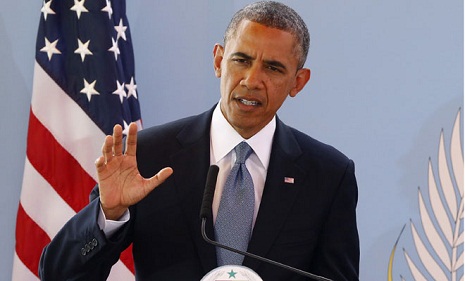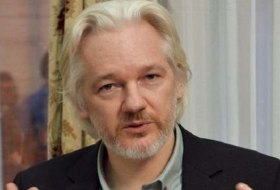Original Post:
At this week`s summit on combating violent extremists, President Barack Obama hopes to concoct ways to battle a threat made newly relevant by attacks in Western Europe, Canada and Australia.
But in planning and describing the event in Washington, the White House has consistently avoided naming Islamic extremism as its central focus, and officials say the meeting isn`t meant to cover only the threats posed by the Islamic State terror group in Iraq and Syria.
READ: Poll shows most disapprove of Obama`s handling of ISIS
Extremists drawn to terrorism "come in all sorts of shapes and sizes," one senior administration official said on Monday, adding the U.S. regards the perpetrators of recent attacks in France and Denmark as terrorists, not members of a particular religion.
"We call them our enemies and we`ll be treating them as such," said the official.
The refusal to name Islamic extremism as the central threat has drawn anger from Republicans and confusion from some terrorism experts who say the threat from Muslim-aligned radicals should be addressed directly.
"I think the criticism is understandable -- the terrorists themselves are claiming to be doing this in the name of Islam, and the White House is having to walk this very fine line," said Bobby Ghosh, a CNN global affairs analyst. "It basically risks scorn because people are going to take away from this -- some people -- that the White House is bending over too far backwards and not addressing the problem head on."
Obama and his aides say they`re wary of elevating the terrorists who committed attacks in Paris and Copenhagen into religious warriors, even if those culprits were acting in the name of Islam. And officials worry Muslim communities -- most of which reject extremist ideology -- could be further ostracized if the government focuses on radical cells.
"I don`t quibble with labels. I think we all recognize that this is a particular problem that has roots in Muslim communities," Obama told CNN`s Fareed Zakaria in a January interview. "But I think we do ourselves a disservice in this fight if we are not taking into account the fact that the overwhelming majority of Muslims reject this ideology."
Obama also painted the campaign against radicalization and extremism as "ultimately a battle for hearts and minds" in an opinion piece published Wednesday in the Los Angeles Times. He added that the focus of the summit would be on ways to empower local communities.
He noted that community leaders from major U.S. cities will highlight their own successes in empowering their communities and keeping extremist ideologies at bay.
"We know from experience that the best way to protect people, especially young people, from falling into the grip of violent extremists is the support of their family, friends, teachers and faith leaders," Obama wrote. "Groups like al Qaeda and ISIL exploit the anger that festers when people feel that injustice and corruption leave them with no chance of improving their lives. The world has to offer today`s youth something better."
And in the editorial, Obama again honed in on another root cause of extremism: authoritarian governments that deny human rights, which is often viewed as a festering source of extremism in the Middle East.
Obama again avoided honing in on Muslim extremism -- or as conservatives would have Obama call it, radical Islam. While acknowledging attacks by Muslim extremists, Obama also identified other extremist attacks not perpetrated in the name of Islam, like the attacks on a Sikh temple in Wisconsin in 2012 and on a Jewish community center last year, both perpetrated by white supremacists.
Eric Holder, Obama`s attorney general, downplayed the language the administration chooses to describe its efforts against extremism, and characterized the controversy around the matter as a right-wing media creation.
"If Fox didn`t talk about this, they would have nothing else to talk about," Holder said at a journalism forum in Washington on Tuesday.
"I don`t worry an awful lot about what the appropriate terminology ought to be," Holder said. "I think that people need to actually think about that and think about really, we`re having this conversation about words as opposed to what our actions ought to be?"
In organizing this week`s summit, officials say a priority is identifying and preventing Islamic extremism in the United States, Europe and the Middle East, even if the official name for the event doesn`t spell that out.
The summit, which was announced in the early fall and originally meant for October, was postponed for unnamed reasons. The White House said the January terrorist attacks in Paris, which were perpetrated by Muslim extremists, prompted Obama`s aides to put the summit on the schedule. In the months the summit was delayed, Islamists have also committed attacks in Canada, Australia and Denmark.
The gathering is drawing top U.S. law enforcement and counterterror officials along with foreign and interior ministers from Europe, the Middle East and Asia. Spread over three days, the summit is slated to focus both on efforts within the United States to combat extremist ideology and programs being developed overseas.
U.S. officials say they want community and national leaders to share effective techniques used to combat extremist messages, with a particular focus on social or religious communities` ability to counter extremism within their own ranks.
Vice President Joe Biden, making remarks on the opening day of the summit, said on Tuesday the U.S. "needs answers to go beyond a military answer."
"We need answers that go beyond force," Biden said. "Countries -- all of us, including the United States -- we have to work from the ground up and engage our communities and engage those who might be susceptible to being radicalized because they are marginalized."
Obama will make remarks twice: once on Wednesday during a meeting on how specific U.S. cities are handling the threat of extremism, and again to a meeting of foreign ministers at the State Department on Thursday.
Obama to strike inclusive tone in countering extremism speech
More about:














































